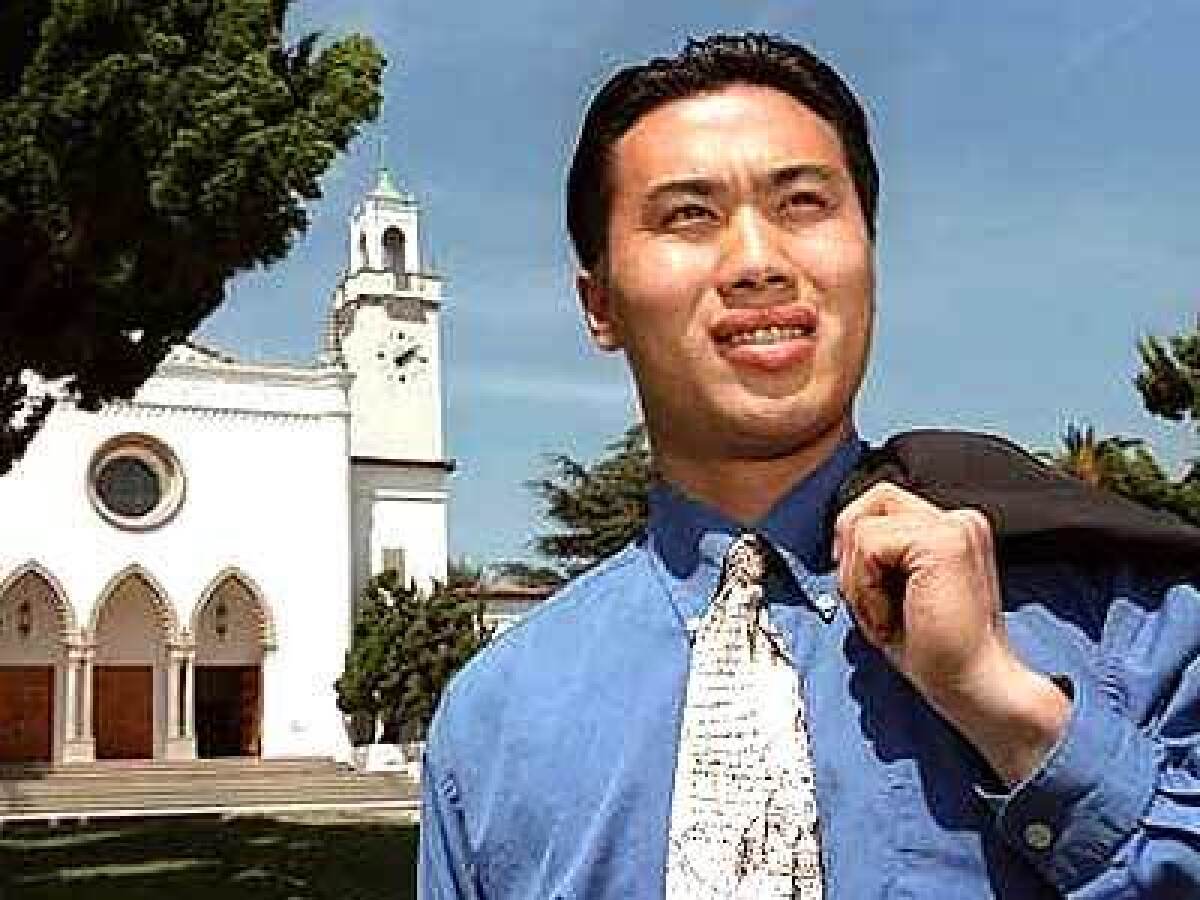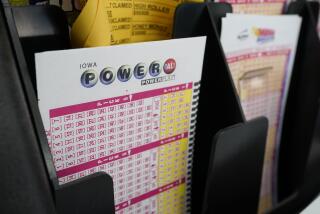Case Study: Lottery Leftovers

- Share via
If you think a million-dollar lottery prize would solve your financial problems, perhaps you should speak to Xuong Do.
Do, 23, won $1.1 million in the California Lottery in 1998. A few months later, the Los Angeles resident had about $200,000 left. How he got there is a tale of taxes, celebratory spending and the financial math of the lottery. But it’s also a tale of promises to keep, which is why Do sought a Money Make-Over.
Much of what’s left is earmarked for supporting Do’s family, especially providing college educations for his siblings. Do, a management trainee for a rental car company, knows that money could be used for his own future too, but he’s firm in his belief that family comes first.
“My main goal is to take care of my family right now,” Do said. ‘That’s why I wanted help. I don’t want to go out and lose it all.”
Sherman Oaks financial planner Mitchell Freedman praised Do’s concern for his relatives but warned that the young man needs to balance his generous nature with pragmatism. That’s the only way Do will be able to both help his family and himself in the long run, said Freedman, a certified public accountant who is a personal financial specialist.
“He is so fortunate to have gotten this start in life but, coming when it did, it’s a tremendous burden and responsibility as well,” Freedman said. “Those resources, when all is said and done, are not going to go as far as he’d like them to go.”
Do’s first decision, to take a lump sum payout of $520,000 instead of accepting the $1.1 million in 26 annual payments, is usually a smart one for the fiscally responsible. The lump sum is based on what the state must spend now in U.S. Treasury bonds to provide payments in the future. But those bonds earn a fairly conservative interest rate, typically 5% to 7%. A savvy investor would have an excellent chance of turning that $520,000 into far more than $1.1 million in 26 years, even while spending some along the way.
The logic of taking the lump sum is undermined, however, when much of the cash is spent upfront.
Among other purchases, Do bought a new Ford Explorer for himself, trips to Hawaii for his parents and $30,000 in jewelry for his mother. That $30,000 alone could have grown to more than $800,000 by the time Do is retirement age, had he invested it at an average 8% return
Do says he doesn’t really regret the splurge because of the sacrifices his parents have made over the years. Do’s mother and father were born to wealthy families in China who fled the 1949 Communist revolution to settle in Vietnam. Thirty years later, Do’s family escaped from Communism again, this time as boat people.
Do was only 3 at that time and says he has no memories of the treacherous passage. But his mother tells him of standing shoulder to shoulder with 500 other people on a 30-foot boat, their only possessions carried in two hand-held suitcases.
A Mennonite family in Indiana eventually sponsored Do’s family to come to the U.S. A year later, the Dos moved to San Diego to be near Do’s uncle.
“Both my parents have given up so much to come here and give us the opportunities we’ve had,” Do said. Familial responsibilities “were instilled at a very early age. It’s my first priority.”
Do says he might have braked his spending earlier had he consulted a tax advisor, however. He wound up having to pay an additional and unexpected $41,000 tax bill in April 1999 because the state hadn’t withheld enough of his winnings.
The state withheld 28% of Do’s award last year, giving him a check for $374,000. But the lump sum payout drove Do into the highest federal tax bracket, which meant he owed 39.6% of the payout to the federal government. (California Lottery winnings are exempt from California income taxes.)
California Lottery spokeswoman Norma Minas said the agency can’t predict a winner’s tax bracket. Instead, lottery winners are given a booklet advising them to seek tax help. Do says in the excitement of getting his check, he doesn’t remember getting the booklet or any warning that the tax withholding might not have been enough.
Practically speaking, Do couldn’t have done much to change his tax bracket, but he could have taken a few steps to reduce his tax bill before Dec. 31, 1998, such as placing the proceeds in a tax-exempt money market fund instead of the taxable bank certificate of deposit he used.
Do’s best course now is to conserve what’s left as much as possible and look for the smartest long-term uses for the money, Freedman said.
Do expects his nest egg will continue to shrink in the next several years.
Helping his family means that Do’s expenses are now about $30,000 a year, or $6,000 more than his current salary. Those expenses will increase this fall when he will begin to defray some costs for his sister, who was recently accepted to a private Los Angeles college. Once she’s through school in four years, Do’s brother will be ready to start.
Do originally thought he might use what was left of his lottery winnings to buy an apartment building, which could both house his family and provide income.
Freedman nixed the idea, saying Do shouldn’t tie up his money in property right now, because the young man will need to tap the money for living expenses and educations.
Do should consider investing in himself, though, Freedman said.
For example, taking part of the money to send himself to graduate school for a master’s in business administration would not only boost his opportunities but also most probably his lifetime income.
Since Do will need cash for the next several years, Freedman recommended Do keep $30,000, or 15% of his remaining winnings, in a money market fund. If he plans to go to graduate school himself, he should keep more in that fund.
For the rest, Freedman suggested investing in stock mutual funds that provide growth as well as income: 20% in a stock index fund, 30% in a growth and income fund, and 10% each in small-company, mid-size company and international funds. The mix is fairly aggressive, because Do is young and has many years to ride out market swings, but is tempered by the more conservative growth-and-income fund, which should provide some stability in rough markets.
Because Do initially expressed interest in investing in technology and Internet stocks, Freedman said the young man could put the final 5%, or about $5,000, in a technology fund.
“Taking a flyer on it might be something that gives him personal pleasure,” Freedman said. “If you don’t have the stomach for it, though, you shouldn’t be in it.
The good news is that even if Do uses half of his nest egg to help his family and himself over the next few years, the $100,000 that remains could provide him with a substantial retirement fund.
If he averages 8% returns on the money, he could have $1.3 million by the time he is 55 or nearly $3 million at 65. Whether that’s enough to allow him to actually retire will depend on many factors, including how long he lives, what kind of pensions or other retirement income he might have and the lifestyle he wants to lead. To be safe, Freedman also recommended Do take full advantage of his company’s 401(k) plan when he becomes eligible to contribute.
“You can build a very substantial nest egg over time that way, especially if you start early,” Freedman said. “It gets to be a habit.”
888
Overall recommendations:
* Rein in spending and encourage siblings to seek as much financial aid as possible.
* Don’t tie up money in illiquid investments such as real estate
* Consider using at least some of the money to get an MBA to boost lifetime income.
Recommended portfolio:
* 15% in a money market fund such as Vanguard Prime Money Market Fund
* 20% in a stock index fund such as Vanguard Index 500 or Schwab 1000
* 30% in a growth and income fund such as Stein Roe Growth & Income or American Century Income & Growth
* 10% in a mid-size company stock fund such as Oak Value or Weitz Value
* 10% in a small-company growth fund such as Baron Asset Fund
* 10% in an international fund such as BT Investment International Equity or Vanguard Total International Stock Index* 5% in a technology or Internet fund such as as Fidelity Select Technology or the Internet Fund
More to Read
Sign up for Essential California
The most important California stories and recommendations in your inbox every morning.
You may occasionally receive promotional content from the Los Angeles Times.













